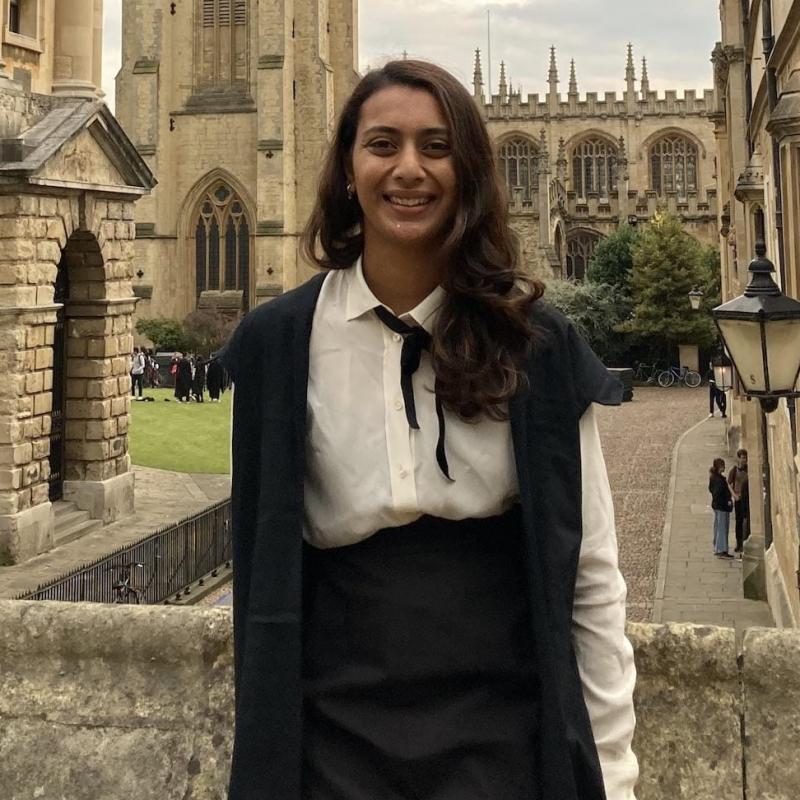Breadcrumb
At 22, Swathi Ramprasad is one of the youngest students in the Master of Public Policy class of 2021.
A recent graduate of Duke University where she double-majored in computer science and public policy, Swathi has worked at the intersection of technology and public policy. Her undergraduate thesis, a study on how algorithms used in the US court systems can discriminate against certain racial and age populations, married these two subject areas.
Swathi joins the MPP in the hopes of finding her policy niche so that when she returns to the US, she will have the tools required to drive community change.
During her undergraduate degree, she worked with a team of distinguished academics to pioneer the Cyber Policy and Gender Violence Initiative. Using a variety of policy approaches including data and advocacy, the team seeks to examine how to mitigate the impact of technologies on the safety of survivors. The internet can be a challenging place for those who have experienced gender-based harm, and Swathi believes it’s important to centre these voices when considering issues of technology policy.
Swathi also took advantage of her summer breaks to undertake internships, first at Facebook’s civic integrity team working on political software. The project she was working on was one part of a series of enforcements against malicious political actors and the digital activities that they undertook during elections. Next, she worked at the American Civil Liberties Union working on issues of youth justice, the school-to-prison pipeline, and youth privacy on educational technology platforms.
Throughout her undergraduate studies, Swathi also worked on a community mentorship project with refugees in Durham, North Carolina. During this time, she was confronted with the real barriers people face that could very easily be mitigated by policy:
“This was a really transformative experience for me. I worked with female refugees in a one-to-one mentorship programme that I helped to lead and I really saw how policy can affect people’s lives. Not being able to get welfare application forms in your language of origin and minimum wage jobs having grammar tests included as part of the application are both huge barriers for people arriving from countries where English was not their first language.”
Her experience working with refugee women forced her to see policy not just in theoretical terms but as a means for really impacting people’s lives – whether it be in a positive or a negative way. As she had also enjoyed the public policy strand of her previous university studies enormously, when she was coming to the end of her degree, she began to think about pursuing further study in this field:
“I was torn between getting some work experience after undergrad or applying to graduate programmes. The state of the world [during the pandemic] when I was finishing my degree and my love for public policy made me feel it would be a good time to dive deeper. The Blavatnik School’s MPP was the only programme I applied to due to the global perspective it offered. When I got in, I was overwhelmed with gratitude and excitement.”
Swathi’s dedication to public service and clear potential as a policy leader have also been recognised by the Eisenhower Global Scholars programme, which offered her one of four scholarships for future leaders to pursue master’s studies in Europe.
Her previous work both on the community outreach side of supporting refugees and as a researcher using technology and innovation to support groups that policy struggles to reach were areas she highlighted on her application. She also articulated her desire to keep her career options open while exploring different aspects of policymaking, and her long-term ambition to work on policies that help empower communities.
Since arriving at the School, Swathi has been impressed by the broad range of backgrounds as well as professional and life experiences each of her classmates bring to the course. Several of the student-led events which focus on cohort members’ past experiences and home country contexts have been particularly inspiring:
“It’s been incredibly inspiring already to learn from my classmates who have found their north stars and have devoted their lives to their issue spaces. It gives me immense optimism about the future generation of global policymakers.”
Having come from a background where the focus was domestic policymaking, the community at the School has already begun to open her eyes to more global approaches. She describes the city of Oxford as an “intellectual haven”, with a “magical ability to broaden one’s thinking”.
Her time in such a unique environment has inevitably led Swathi to think through what’s next. In the long term, she sees herself working in thoughtful policymaking that helps empower communities, whether that be at the federal or local government level. In today’s world, the reasons for inequality are many: be it technology, gender, or political instability. Swathi hopes to use her education, experience, and learnings from the cohort to build a future of thoughtful and inclusive policy.
January 2022.

